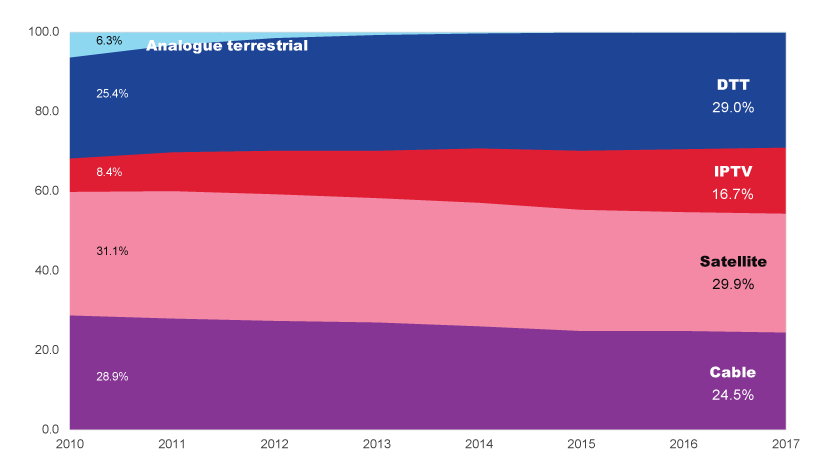 The EBU is not worried about DTT shutdowns in Belgium and Switzerland, writes Marcello Lombardo, EBU.
The EBU is not worried about DTT shutdowns in Belgium and Switzerland, writes Marcello Lombardo, EBU.
Last May Belgian public broadcaster VRT announced that its free-to-air DVB-T transmissions would end on 1 December 2018*, citing “changing media consumption usage”. Just a few months later, in the aftermath of the “No Billag” referendum (which proposed to eliminate the mandatory licence fee to fund broadcasting), Swiss public broadcaster SRG SSR announced the end of DVB-T transmission in 2019.
Jumping to conclusions
Taking these decisions in Switzerland and Flanders together, one might conclude that the sun is setting on digital terrestrial television (DTT). However, before rushing to conclusions, we should carefully analyse the specific contexts and the overall trends.
The EBU Media Intelligence Service regularly produces an excellent report on TV Distribution in Europe. It provides data on, among other things, the penetration of the various television distribution platforms.
Analysing the data, we see that, in terms of television distribution, Belgium and Switzerland are very similar. In both countries the primary distribution technology has historically been cable, now being gradually replaced by IPTV; and in both countries the combination of cable and IPTV serves more than 90% of households as the main reception mode, followed by satellite and DTT. The latter has never exceeded 5% penetration as the main reception mode in either Belgium or Switzerland, amounting to a very small number of households in absolute terms.
No other country in Europe has a television distribution landscape that mirrors these extreme figures.
The similarities between Belgium and Switzerland continue when it comes to infrastructure capabilities, particularly the coverage of cable and fixed broadband. The European Commission document Broadband Coverage in Europe 2017 provides the data.
For cable, both Belgium and Switzerland appear in the top four. In fact, in Belgium coverage exceeds 95%, while in Switzerland it exceeds 80%, both countries far
above the EU-28 average of 45.1%.
For fixed broadband, the NGA (next generation access) combination category, which comprises VDSL, FTTP and DOCSIS 3.0 technologies (all typically capable of delivering a service speed of at least 30 Mbps), sees Belgium and Switzerland in the top three. Both show coverage levels above 95% against the EU-28 average of 80.1%.
200,000 VS. 60 million
With this clarity about the context in these two countries, it becomes easier to understand why the decisions regarding DTT have been taken. In Belgium and Switzerland DTT has never historically been successful; switching the service off impacts only a very limited number of households (about 200,000 in total). Most, if not all, impacted households are covered by alternative distribution platforms (like cable, IPTV or satellite), which ensures continuity of service and the fulfilment of public service obligations. For the vast majority of European countries, switching off DTT is simply not an option owing to the absence of a sufficient offer of alternative platforms.
While in Belgium (or at least Flanders) and Switzerland, public broadcasters have elected to switch off DTT, we see that in the rest of Europe the platform is strong and stable. As of 2018, 29% of households in the EU-28 rely primarily on DTT. That’s almost 60 million households versus the 200,000 affected by the decisions in Belgium and Switzerland.
The impressive adoption rates for DTT, for which total penetration exceeds – and often far exceeds – 50% in more than 20 European countries, have led many of the earlier adopters to actively plan an upgrade of their transmission technology from DVB-T to DVB-T2. This is another strong indicator of the good health of the platform.
Numbers don’t lie. DTT is here to stay.
*The VRT channels remain available on the Antenne TV DVB-T2 pay-TV platform.
**Source for the chart above: EBU / Ampere